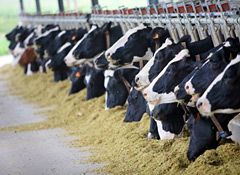Sign In

Menu
Suggested Searches
Recent Searches
Suggested Searches
Product Ratings
Resources
Chat With AskCR
Resources
All Products A-ZThe payment for your account couldn't be processed or you've canceled your account with us.
Re-activateMy account
Sign In
My account
Sign In


Following the U.S. Department of Agriculture announcement last week of a new case of mad cow disease in California, Consumers Union, the advocacy arm of Consumer Reports, today called on the USDA and the Food and Drug Administration to take new measures to detect and prevent mad cow disease in U.S. beef and dairy cows.
According to the USDA, the case exhibited the "L-type" atypical mad cow strain. In a letter to the USDA and FDA, Consumers Union cited studies that suggest L-type can be transmitted to humans, possibly even more easily than classical Bovine Spongiform Encephalopathy, the type of mad cow disease that resulted in more than a hundred deaths in the United Kingdom.
Since 2005, the number of cattle tested for mad cow disease has fallen almost 90 percent, according to USDA statistics. The USDA tests only 40,000 of the 35 million cattle slaughtered in the U.S. annually. Finding a case of mad cow in the USDA's currently small testing program is a warning flag, said Consumers Union.
Senior scientist at Consumer Reports Michael Hansen said It's essential that the USDA conduct a thorough investigation of the California case, including testing of all of the infected cow's offspring, and all cows that may have consumed the same feed. "The fact that this is an L-type atypical mad cow strain means that this case is not necessarily a spontaneous case, but rather could have been acquired through infected feed," Hansen said. "L-type cases have been detected before in Europe and Canada."
Consumers Union also called on the FDA to ban certain materials in cattle feed that could potentially transmit mad cow disease, including all brains, blood and poultry litter.
"Beef slaughterhouse waste is fed to chickens, and a lot of the chicken waste then ends up being fed back to cattle," said Hansen. "This should not be allowed, as we are turning cows into cannibals, the practice that started the mad cow problem in the first place."
Related:
What should be on a label (but often isn't)
Source:
Consumers Union Cites Risks In "L-Type" Strain Of Mad Cow Disease, Urges USDA To Conduct Thorough Investigation Of California Case And Expand Testing [Consumers Union]
—Maggie Shader
 Build & Buy Car Buying Service
Build & Buy Car Buying Service
Save thousands off MSRP with upfront dealer pricing information and a transparent car buying experience.
 Get Ratings on the go and compare
Get Ratings on the go and compare
while you shop